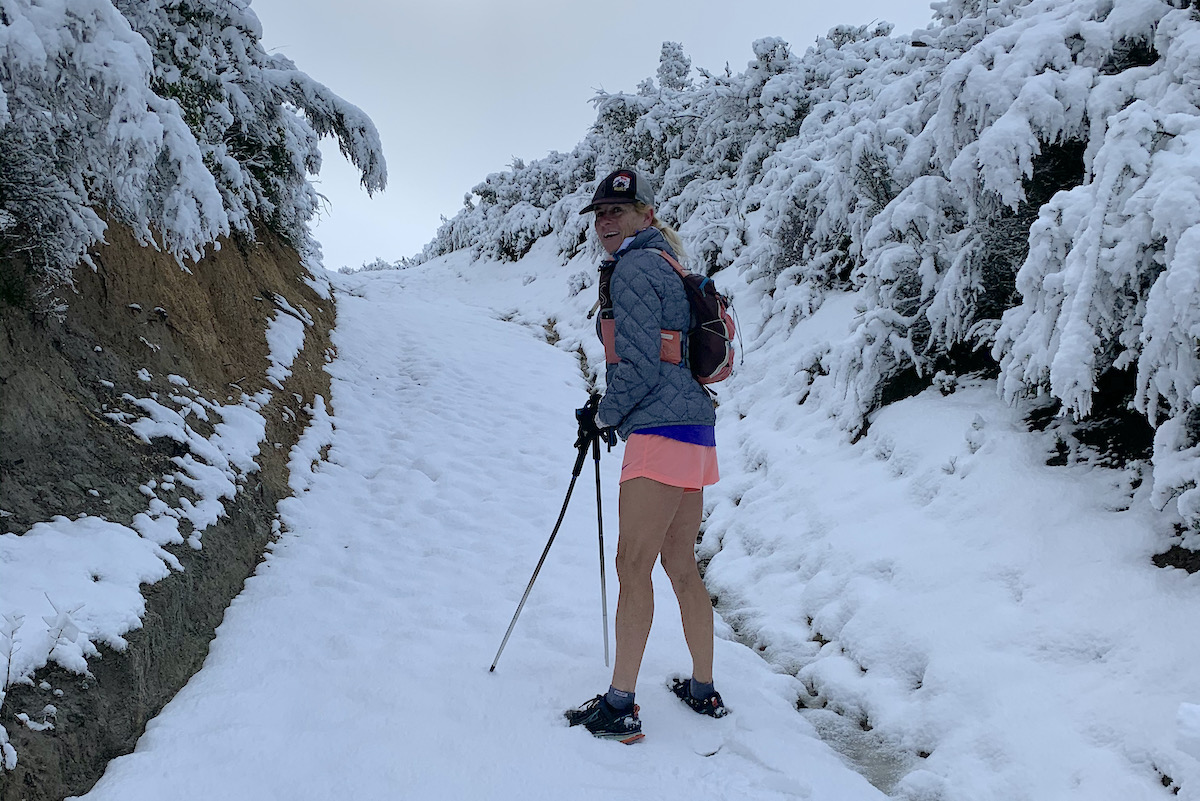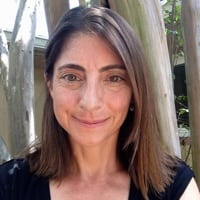Salley Hernandez has been running ultramarathons since her time in the Marine Corps, when she was stationed near Irvine, California, in 1992. She has used drink koozies with duct tape handles to carry her water bottles, trained in cotton socks, raced throughout her 20 years of military service, raised three girls, and moved more times than you could imagine.
She’s completed the Last Annual Heart of the South Road Race (HOTS), one of Lazarus Lake‘s creations where you don’t know the route of the 300- to 350-mile race until you arrive at the start line. Sally ran 326 miles at HOTS in 2021 in just over seven days. She prepared by running the Swammie Shuffle 200 Mile in February 2021. Of course, she’s registered for the 314-mile Last Annual Vol State Road Race (Vol State) this July.
Salley is 56 years old and a true force of nature.
[Author’s Note: The following interview has been edited for brevity and clarity.]
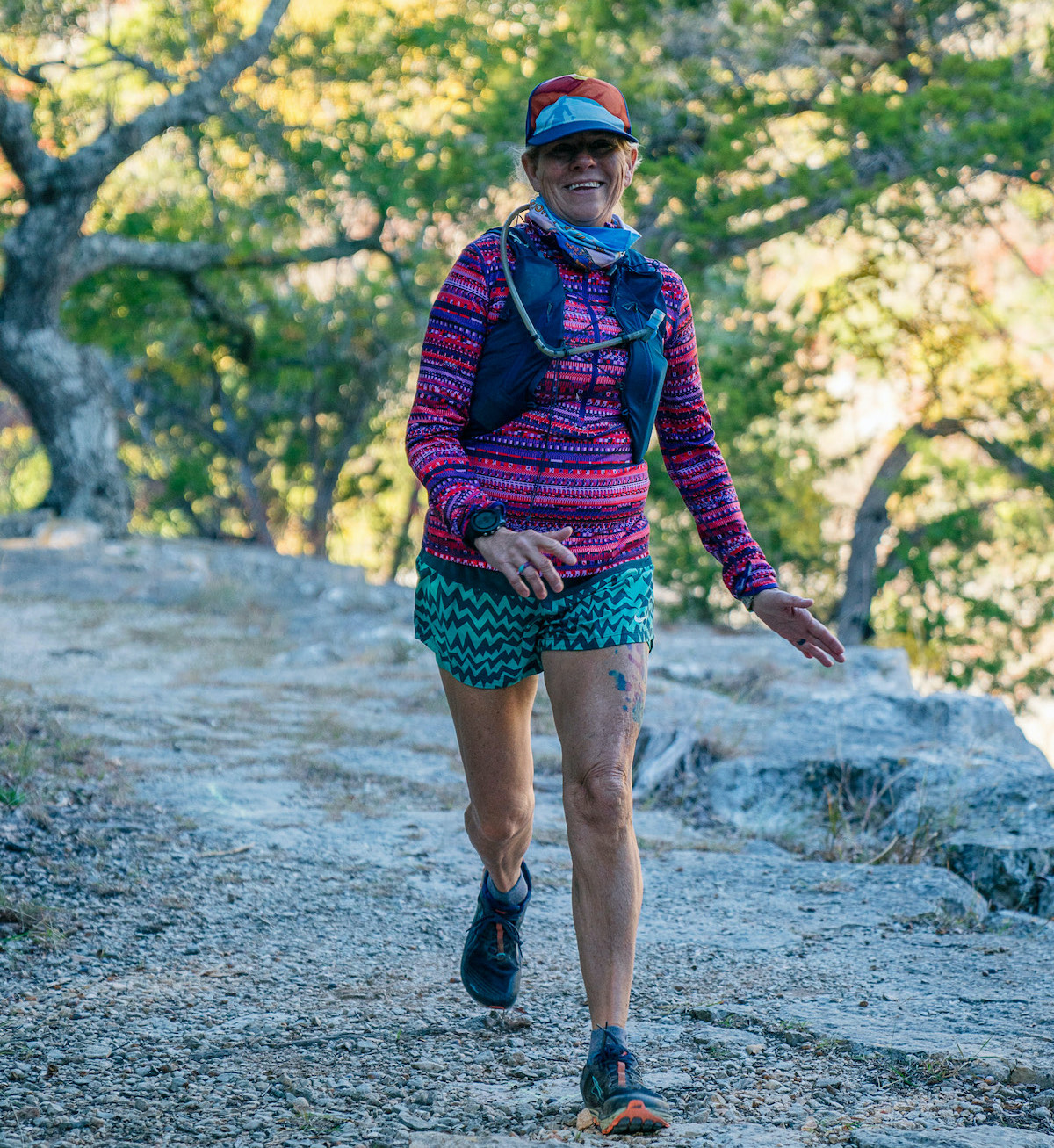
Salley Hernandez makes her way down the trail during the 2021 Band of Runners Trail Camp for military veterans in Texas. Photo: Will Harrison
iRunFar: You’re registered for Vol State this coming July. That’s 314 miles (500 kilometers) across Tennessee. What brought you to this point in your ultrarunning journey? When did you first start running trails and ultras?
Hernandez: It was after the first Gulf War in 1992 when I got stationed in El Toro in California. [Editor’s Note: El Toro is now known as Lake City.] Steve Harvey, he runs the Old Goat Races, and another Marine named Lou Ortega, and Kent Street, a civilian tech rep who worked in the hangar where my squadron was, noticed me running and asked if I’d ever thought about running trails.
I had run some trails in Hawaii because I grew up there, but I didn’t know trail running. I ran cross-country and track in Hawaii, and we would go hiking to the falls and run on the trails there, but we didn’t call it trail running. That was in the late ’70s and early ’80s.
I’d actually done the Oahu Perimeter Relay with our cross-country team, so I was doing some long-distance. I went from running cross-country to running my first marathon in 1983. My first ultra was in 1992, the Poway Ridge 50k in San Diego.
We used to rip race entries out of the back of the magazine. And then we mailed it in with a check or money order and wait for a response.
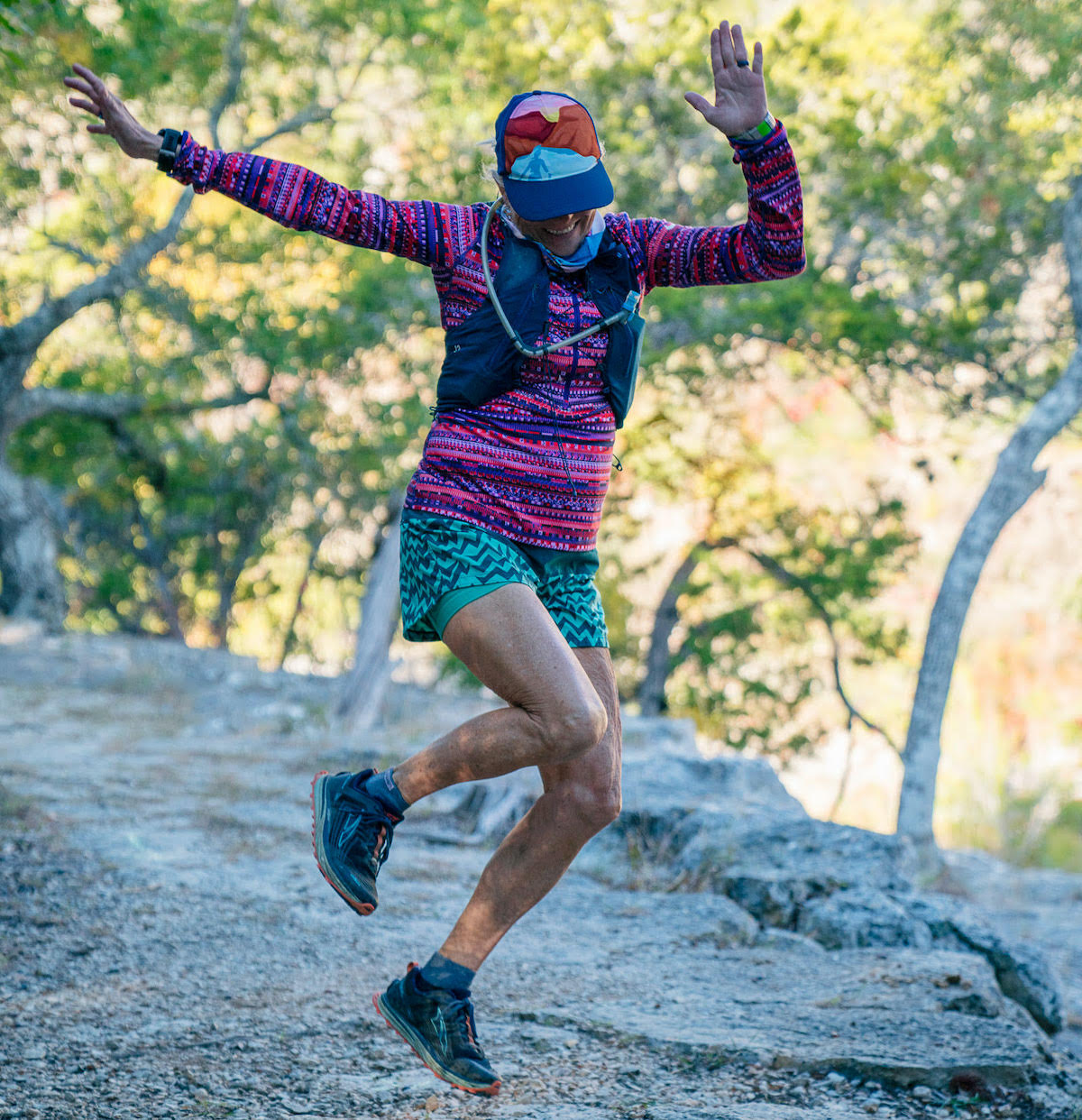
Salley Hernandez jumps for joy during the 2021 Band of Runners Trail Camp for military veterans in Texas. Photo: Will Harrison
iRunFar: Did you step away from training and racing after that race in 1992?
Hernandez: There was a break in there for deployments and being stationed overseas. I was stationed in Korea for a year and at [Marine Corps Air Station] Iwakuni in Japan for a year. I was deployed for six months to Australia. I was also in Egypt, Turkey, and Bahrain.
I didn’t do a whole lot of running there because when you’re in another country, you have to respect the rules and regulations. Back in the ‘90s and early 2000s, women couldn’t just run around off base alone. It was very different then.
Also, I had babies. I had three girls. I remember when I was pregnant, they wouldn’t let me participate in physical training with the squadron. They always kind of looked down on my training the whole time when I was in the Marine Corps. When I would ask for a weekend off to do a race, I wasn’t given permission a lot of times. So if it was less than 100 miles, I went anyway because they just didn’t understand what ultras were.
iRunFar: So when you retired from the Marines, did you get back to racing more regularly?
Hernandez: No, when I got out, I cried for six months because that was the first time I was alone with all my kids, and I felt like they didn’t like me.
I can remember going out — we were stationed in Jacksonville, Florida — and my husband had just deployed, and I was home alone with three little ones. I remember starting out with two in the stroller and one on a bike, and we didn’t even make it a mile down the road before we were all crying and walking back to the house. I didn’t know how to structure my time. I was trying to adjust to being a stay-at-home mom with their dad deployed.
I didn’t race while we were in Florida. I didn’t race again until we moved to Virginia. I was about 45 years old then. And I didn’t start doing more ultras until we moved to Twentynine Palms, California. I was a physical education teacher, I had the time, and my girls were all old enough it wasn’t a big deal when I was gone for a race.
iRunFar: Did you worry that you were too old to take up ultras again and race well?
Hernandez: No. I thought as long as I could keep moving and keep relatively injury-free, I’d be fine. The women I ran with in San Diego were way younger, but they didn’t look at me as being old because a lot of times, I’d kick their butts. When I go out on a run, I don’t know what happens, it just puts me on a common ground with somebody. I can relate to them, and I don’t feel like they’re judging me. I mean, even at my age, I don’t feel like they’re judging me.
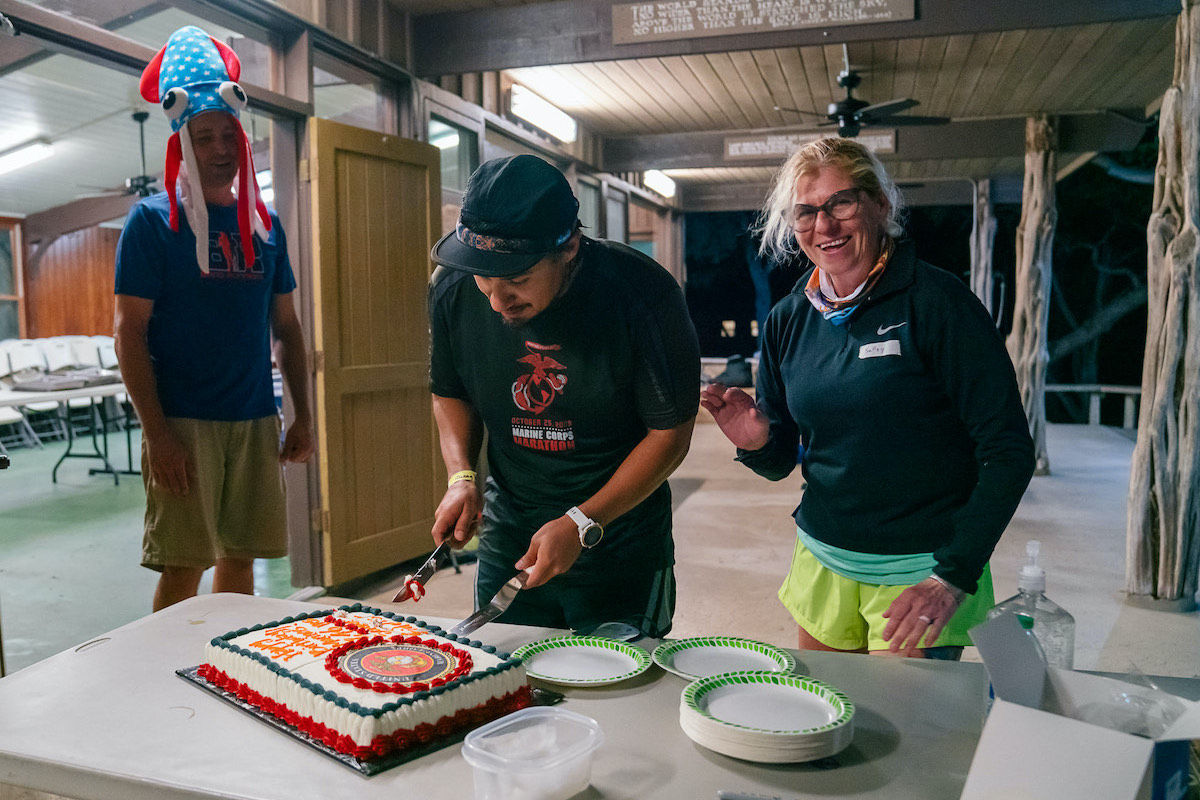
Salley Hernandez and Manny Gonzalez, the oldest and youngest Marines present, celebrate the Marine Corps’ 246th birthday at the 2021 Band of Runners Trail Camp in Texas. Photo: Will Harrison
iRunFar: Why are there so few women in their late fifties and sixties running ultras or trail races? Why do older runners stop participating in races?
Hernandez: Probably injuries. If you get injured, and you have to stop, it’s harder to get back into it.
iRunFar: What do you have to deal with now in training and racing that you didn’t have to when you were in your forties?
Hernandez: Probably fatigue. Recovery time is a bit longer. But I just adjust for it. I tell myself that I can’t do it all, and that’s okay. There’s nothing wrong with walking. It doesn’t mean anything if you can’t run up the hills anymore. That’s the hard part for people. They want to do what’s written out for them in their training plan.
iRunFar: As you’ve gotten older, what parts of your body do you feel like are betraying you?
Hernandez: My lower back and my shoulders.
iRunFar: Describe a typical training week.
Hernandez: When I’m training for a race, I try to alternate two high weeks with a maintenance week. In the high weeks, I’ll hit about 70 miles or more. Then I drop back down to a maintenance week where I’ll run 25 to 30 miles. I used to go for a whole month of high mileage. I’d do 400 miles in a month when I was younger.
iRunFar: Do you still incorporate a lot of long runs in your training?
Hernandez: Yes, I’ll do back-to-backs. I might do 10 miles on Friday and then 24 miles on Saturday and Sunday.
iRunFar: What do you still get out of running after so many years?
Hernandez: It makes me happy. It calms me down. I don’t feel socially awkward or unacceptable. When you’re out on a trail run, everyone’s going through that same pain cave, so it kind of puts you on the same playing field.
Usually, when I get around a group of people, I don’t know what to say or what to do, but when you’re out there running, you find common ground. I don’t know, I think we just connect better to the people with whom we’re training or racing.
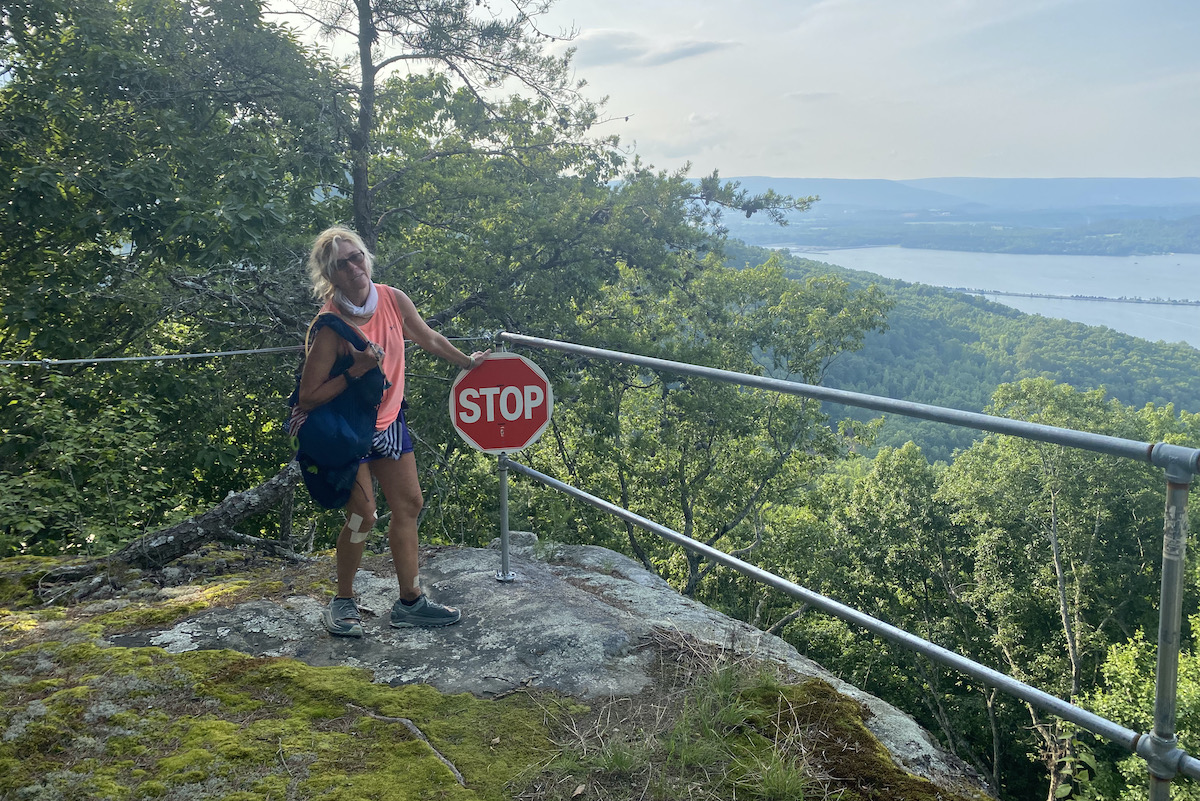
Salley finishing the 2021 Heart of the South Road Race at Castle Rock near Kimball, Tennessee. Photo courtesy of Salley Hernandez
iRunFar: Why not just do half marathons or marathons?
Hernandez: I was asked to join the Marine Corps Marathon team in the late ’80s. I remember standing there and weighing maybe 103 pounds and being told I was too fat to be competitive. I’d run the Orange County Marathon in 2:52, and I was told I was too fat. I was 24 at the time … In trail running, it didn’t matter what you looked like or how fast you are. It’s just about your journey to get you to the finish line.
iRunFar: How did running 326 miles at HOTS change you as a runner? What did you gain from that race?
Hernandez: I learned that I’m a lot stronger than I thought.
iRunFar: You still had that to learn after your time in the military?
Hernandez: I mean, I knew I could do it. It never crossed my mind that I couldn’t finish. It was just a matter of when. I just realized I could do a lot on my own. I’m not as helpless on my own as I thought I was.
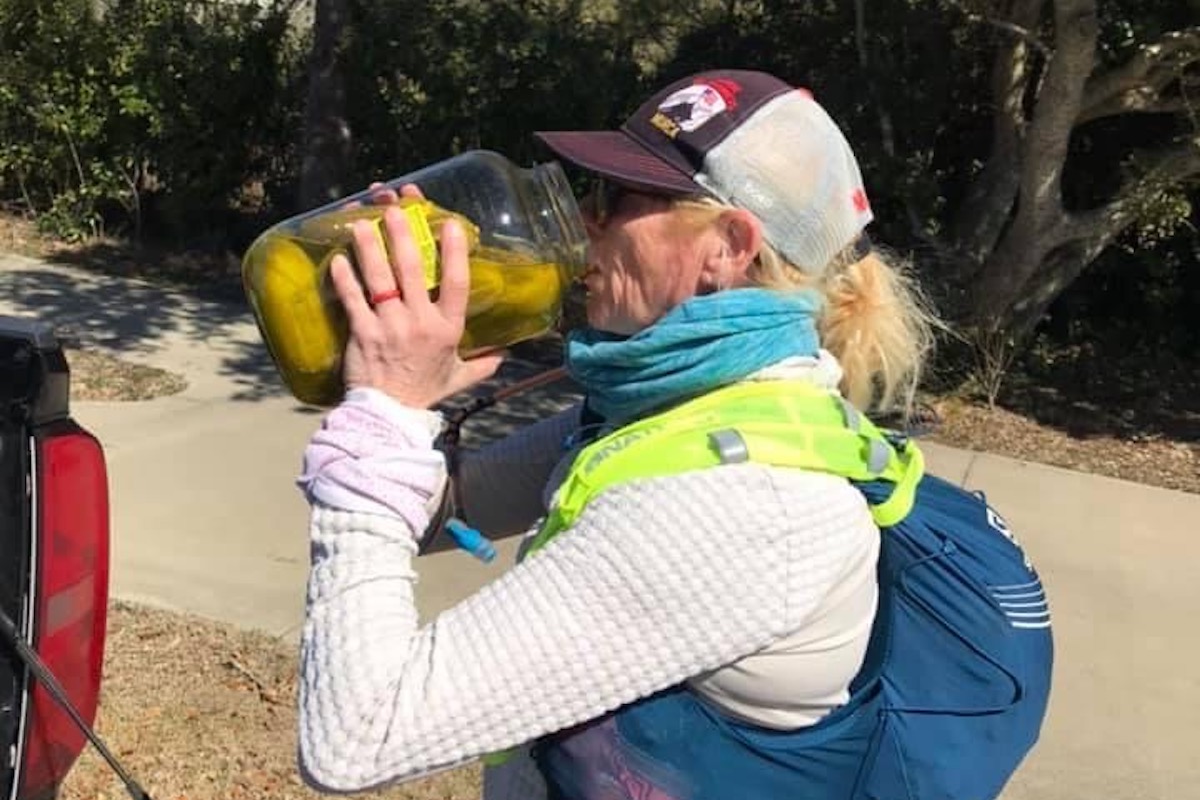
Hernandez drinking pickle juice during the 2021 Swammie Shuffle 200 Mile in Virginia. Photo: James Huller
iRunFar: What do you hope to get out of Vol State?
Hernandez: Probably the same thing. I also want to challenge myself and see if I can go a little faster now that I know what it entails to keep going day after day after day. I’m going to make better plans instead of winging it. When I think about it, I was the queen of naps during HOTS. Maybe if I didn’t take so many naps, I could have finished 12 hours earlier.
iRunFar: Do you look at age group records when you sign up for races?
Hernandez: Nope. I never do. People point it out to me, but I don’t really think about that. I’m just thinking about whether I can get to the end.
iRunFar: Do you think race directors should think about whether runners in their fifties, sixties, seventies, and older can make their race cutoffs?
Hernandez: If they want to keep their race going strong, I think they should open it up and make it accessible for everybody. But I don’t really look at the cutoffs when I choose a race. And sometimes I’ll get there and find out what they are and think, Oh shit! And then I usually end up running better than I thought I would.
iRunFar: What would you tell 20-year-old runner you?
Hernandez: That you should stick with running, and not let life get in the way of things. Fight more to be able to do what you want to do with running.
iRunFar: You just attended the Band of Runners Trail Camp — a running camp for military veterans and surviving family members. You’ve been running longer than some of the running mentors there. What drew you to camp despite all your experience?
Hernandez: Like I’ve said, I’ve always been in this shell. I thought I could connect to people like me. What do they do when life gets in the way? With the guys in my running group at camp, we talked about life and family. We bonded over questions like, what do you do for this and how do you handle that?
A lot of them said when they got out and things got bad, they drank. That is usually a big part of what everybody does when they get out of the military and they can’t handle something. We’re struggling, and we hurt, but we all realize that the common ground is: We can do this, we can be stronger. I met some wonderful people out there. The whole trail community is unlike anything I’ve ever encountered.
iRunFar: What else do you want people to know?
Hernandez: Everything sucks at one point. Everything literally sucks. Literally at ass level. How do you rise above that?
I think that’s what trail running helps people do. It brings you so far out of your comfort zone, and it breaks you down. It humbles you. And then it pulls you up. That feeling you get when you get to the finish is unlike anything else. You get all these raw emotions that come out. You have to experience it.
It doesn’t matter if you finished a hundred times before. Every time you finish that feeling is going to be different because your journey to get to the end was different whether it’s a 50k, 50 miler, or Vol State.
It’s the journey you [had] to get there. And when you think about it, you did it. You’re the one that was out there doing it. So when you get inside your head, you can remember that. You can do this. It’s good for you.
iRunFar: What’s next for you after Vol State?
Hernandez: I’d like to run Ultra-Trail Mt. Fuji. When I was in the Marine Corps, I hiked up the mountain. That was in 1993. It’s been on my bucket list. I’ve also been looking at Leadville [Trail 100 Mile] and the Hardrock [100].
2021 Tunnel Hill 100 Mile Age Group Results
The 2021 Tunnel Hill 100 Mile in Vienna, Illinois, saw four new age-group records! Take a look at these performances and the overall age-group records set:
- Men’s 45-to-49 age group winner: Chris Jones, 17:11:53 (Record: Dan McHugh, 15:22:00)
- Women’s 45-to-49 age group winner: Chari Gay, 18:10:06 (Record: Loretta Tobolske-Horn, 17:21:56)
- Men’s 50-to-54 age group winner: John Seals, 20:42:21 (Record: Bill Shires, 17:05:34)
- Women’s 50-to-54 age group winner: Christine Kitzler, 26:06:09 (Record: Cathy Downes, 17:52:49)
- Men’s 55-to-59 age group winner: David Peterman, 18:23:43 (Record: Jeff Mires, 17:50:50)
- Women’s 55-to-59 age group winner: Elaine Stypula, 22:46:30 (Record: Connie Gardner, 18:30:55)
- New men’s 60-to-64 age group record: Steve Troxel, 19:44:02
- Women’s 60-to-64 age group winner: Kimmy Riley, 27:11:08 (Record: Dawn Hamel, 22:27:33)
- Men’s 65-to-69 age group winner: Marlin Weekley, 25:17:44 (Record: David Jones, 17:34:29)
- New women’s 65-to-69 age group record: Kathryn Kramer, 27:32:46
- New men’s 70-to-74 age group record: David Jones, 19:35:29
- New men’s 75-to-79 age group record: Wally Hesseltine, 26:11:45
Call for Comments
- Are you a military veteran who has come to love trail running?
- What has trail running helped you to overcome in your life?
